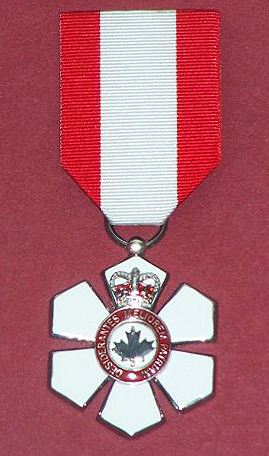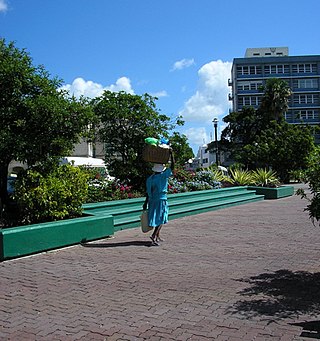In the United Kingdom and the British Overseas Territories, personal bravery, achievement, or service are rewarded with honours. The honours system consists of three types of award:

The Order of Canada is a Canadian state order and the second-highest honour for merit in the system of orders, decorations, and medals of Canada, after the Order of Merit.
Orders of Commonwealth countries.

The New Zealand royal honours system, a system of orders, decorations and medals, recognises achievements of, or service by, New Zealanders or others in connection with New Zealand. Until 1975, New Zealand used the British honours system. Since then the country has introduced a number of uniquely New Zealand honours, and as of 2021, only the dynastic British honours continue in active use in New Zealand, with the exception of the Order of the Companions of Honour.
The Australian honours and awards system refers to all orders, decorations, and medals, as instituted by letters patent from the Monarch of Australia and countersigned by the Australian prime minister at the time, that have been progressively introduced since 14 February 1975. The Australian honours and awards system excludes all state and local government, and private, issued awards and medals.
Post-nominal letters, also called post-nominal initials, post-nominal titles, designatory letters or simply post-nominals, are letters placed after a person's name to indicate that the individual holds a position, an academic degree, accreditation, an office, a military decoration, or honour, or is a member of a religious institute or fraternity. An individual may use several different sets of post-nominal letters, but in some contexts it may be customary to limit the number of sets to one or just a few. The order in which post-nominals are listed after a name is based on rules of precedence and what is appropriate for a given situation. Post-nominal letters are one of the main types of name suffix. In contrast, pre-nominal letters precede the name rather than following it, such as addressing a physician or professor as "Dr. Smith".
The Cross of Valour was established in 1975 as the highest Australian Bravery Award. The awards were established as part of the institution of the Australian Honours System. The Cross of Valour has been awarded to five Australian civilians and, although there has been no Australian military recipient, they would be eligible in situations where normal honours to the military do not apply.
The orders, decorations, and medals of Canada comprise a complex system by which Canadians are honoured by the country's sovereign for actions or deeds that benefit their community or the country at large. Modelled on its British predecessor, the structure originated in the 1930s, but began to come to full fruition at the time of Canada's centennial in 1967, with the establishment of the Order of Canada, and has since grown in both size and scope to include dynastic and national orders, state, civil, and military decorations; and various campaign medals. The monarch in right of each Canadian province also issues distinct orders and medals to honour residents for work performed in just their province. The provincial honours, as with some of their national counterparts, grant the use of post-nominal letters and or supporters and other devices to be used on personal coats of arms.
The orders, decorations, and medals of the Canadian provinces, in which each province of Canada has devised a system of orders and other awards to honour residents for actions or deeds that benefit their local community or province, are in turn subsumed within the Canadian honours system. Each province sets its own rules and criteria for eligibility and also for how each award is presented. Most of the awards allow for the recipients to wear their awards in public, and most grant the recipients the use of post-nominal letters after their names. Not all of the awards listed below are part of the Canadian honours system, thus some of them may not be worn or court mounted with awards that are part of the Canadian honours system.
The Jamaican honours system has developed as a unique entity since the passage of the National Honours and Awards Act by the Parliament of Jamaica in 1969. The system is modelled largely on the British honours system, which was formerly conferred on Jamaicans.
The Barbados National Honours and Decorations system is similar to that of the United Kingdom. Likewise, it consists of three types of award – honours, decorations and medals. Appointments are made on a yearly basis on Independence Day by the president of Barbados.
The Governor-General of Australia has, at irregular intervals, notified for general information notifies the positioning of wearing of Australian orders, decorations and medals in the Commonwealth of Australia Gazette. The Order of Wearing Australian Honours and Awards was last published in 2007.
Knight or Dame of St Andrew was an award within the Order of Barbados that was part of the national honours system of Barbados when the country was still a realm within the Commonwealth.

The monarchy of Barbados was a system of government in which a hereditary monarch was the sovereign and head of state of Barbados from 1966 to 2021. Barbados shared the sovereign with the other Commonwealth realms, with the country's monarchy being separate and legally distinct. The monarch's operational and ceremonial duties were mostly delegated to her representative, the governor-general of Barbados.

The Most Distinguished Order of the Nation is an Antiguan and Barbudan order of chivalry recognising distinguished and outstanding service to Antigua and Barbuda, the CARICOM region or the international community. Originally established by the National Awards Act 1987, that act was repealed and the order was re-established and constituted by the Parliament of Antigua and Barbuda under the National Honours Act 1998 which received Royal Assent from the Governor General of Antigua and Barbuda on 31 December 1998.

The Most Illustrious Order of Merit is an Antiguan and Barbudan order of merit recognising meritorious service to Antigua and Barbuda, the Caricom region or the international community. It was established and constituted by the Parliament of Antigua and Barbuda under the National Honours Act 1998. which received Royal Assent from the Governor General of Antigua and Barbuda on 31 December 1998.

Dame Sandra Prunella Mason is a Barbadian politician, lawyer, and diplomat who is serving as the first president of Barbados since 2021. She was previously the eighth and final governor-general of Barbados from 2018 to 2021, the second woman to hold the office. On 20 October 2021, Mason was elected by the Parliament of Barbados to become the country's first president, and took office on 30 November 2021, when Barbados ceased to be a constitutional monarchy and became a republic.
The Order of Freedom of Barbados is a national honour established by the Order of Freedom of Barbados Act 2019 by the Parliament of Barbados. As part within the overarching Order of Barbados, it ranks higher than the Order of the Republic, but is below the separate and supreme Order of National Heroes.
The Order of Barbados is a national Order of honours and decorations for Barbados.

The Order of National Heroes is the supreme honour within the national honours system of Barbados and was established by the Order of National Heroes Act 1998 by the Parliament of Barbados. Members are referred to as National Heroes, and are accorded the style "The Right Excellent". The Order recognises the most prominent figures in Barbados' history. As of 2023, Garfield Sobers and Rihanna are the only two living persons conferred with the title.






